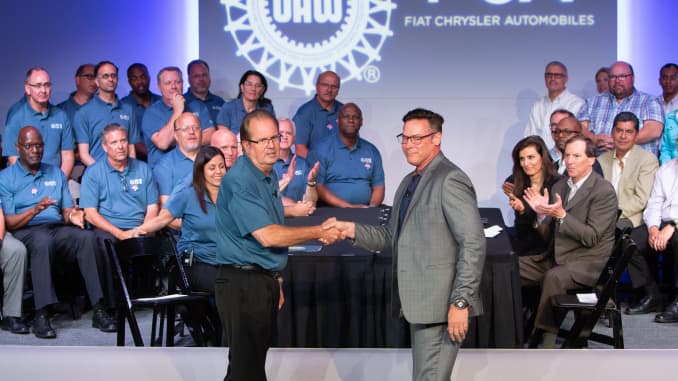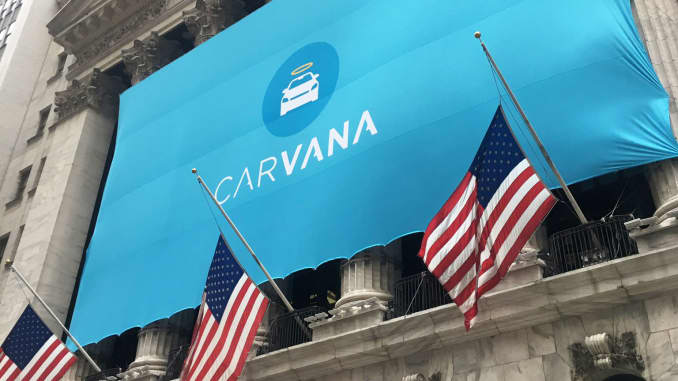Coronavirus pushes auto dealers to embrace online sales like Tesla, Carvana
- U.S. auto dealers have been slow to embrace online sales. However, the coronavirus is changing that.
- Online sales is one of the last chances for salvation for some dealers that have had to close showrooms due to the pandemic and state orders.
- J.D. Power expects U.S. retail vehicle sales to crater 80% this month compared with expectations before the pandemic.

Angelo Salvadore is one of the luckier ones when it comes to his Massachusetts dealerships during the coronavirus pandemic.
The showrooms for his Chevrolet and Fiat Chrysler stores are open by appointment, allowing him to still sell vehicles, unlike dealers in states such as Michigan that have been forced to close due to the coronavirus and “stay-at-home” or “shelter-in-place” orders.
“We’re doing very well with the appointment side of it,” Salvadore said Wednesday. “People are more looking to see what we have online and then are giving us a call. It is working.”
As J.D. Power expects U.S. retail vehicle sales to crater 80% this month compared with expectations before the pandemic, dealers such as Salvadore are being forced to figure out new methods of selling vehicles.
For Salvadore, it’s relying more on his website and appointments. For many others, particularly larger dealers such as Sonic Automotive, it’s embracing online sales.
“We’re still pushing through. We’re dealing with the market we have,” Sonic Automotive CEO David Smith told CNBC. “We’re able to do online virtual sales and a no-contact touchless delivery both in service and our sales customers.”
Sonic Automotive is the nation’s fourth-largest automotive retailer and operates more than 100 stores representing 24 brands in more than a dozen states.
The North Carolina-based company can conduct a majority of the sales process online if a customer wants, Smith said.
Whether dealers can sell and service vehicles under state orders regarding the pandemic varies by state. Most are allowed to remain open for service, but they cannot sell vehicles or they have restrictions on their showrooms. Some, even if the showrooms are closed, can still sell vehicles online.
J.D. Power reports 24 states, which accounted for 44% of 2019 retail sales, allow for dealership sales operations to remain open. The other 26 states, which represented 56% of 2019 sales, have restricted sales completely or allow only for online or remote sales.
Following Tesla, Carvana
While Tesla and Carvana, an online used car sales company, have been selling vehicles online for years, U.S. auto retailers have essentially used the internet as a tool to bring people into the dealership, not to sell vehicles.
Many saw online sales as a threat to their showrooms; however, the coronavirus is changing that. Automakers are rolling out new online sales tools or enhancing current programs for dealers, as they view online sales as one of their last chances for salvation during the pandemic.
Fiat Chrysler, for example, launched a new online sales program this month that allows customers to partially, if not completely, go through the sales process online. As with Carvana and Tesla, the purchased vehicle can be delivered to their home without them ever stepping foot in a dealership.

“While you’re staying at home, there’s absolutely no reason you can’t be online shopping like you do, whether its Amazon or other online retailers,” Mark Stewart, chief operating officer of North America for Fiat Chrysler. “We want to have a process so our customers can do so as well.”
Stuart, who previously worked for Amazon, said the company expects to have about 50% of its roughly 2,650 U.S. dealers using the tool by this week, accounting for a “significant number of sales” in the coming weeks and months.
The automaker, Stuart said, was planning to launch the program in a few weeks but pulled it forward due to the coronavirus pandemic. “We really made it happen to have it to where we could release it several weeks earlier than we had initially anticipated,” he said. “It’s really gaining a lot of momentum for us.”
Others automakers such as Porsche have announced additional incentives for dealers to conduct digital sales. General Motors also has increased the presence on its “Shop, Click, Drive” online sales program, which launched in 2013.
There has been a “rapid adoption” by Ford dealers of online tools such as credit applications, appraisals and other services, according to Mark LaNeve, Ford’s vice president of U.S. marketing, sales and service.
Touchless delivery
Many dealers and companies such as Tesla and Carvana are offering “touchless delivery” options. The process varies by company but a vehicle can be delivered to a customer’s house with any direct interaction with an employee.
Carvana, for example, has an employee unload the car in a driveway, sanitize the steering wheel and keys, then leave the paperwork on the passenger seat for the customer to review and sign. They’ll then call the customer from the car hauler in case they have questions. Once the paperwork is completed, the customer can leave it in a mailbox or another place to be picked up.
“The health of our community at large is the highest priority during this time of uncertainty,” Ryan Keeton, Carvana co-founder and chief brand officer, wrote in an email to CNBC. “One of our company values is, ‘We’re all in this together,’ and our collective efforts are bringing that value to life.”

Keeton declined to discuss the publicly traded company’s sales during the pandemic.
Shares of Carvana are down 26.7% this year. The stock was trading midday Thursday up 14.4% to $66.87.
Cox Automotive’s Autotrader late last month also launched a new program called “Dealer Home Services,” which provides virtual tours, test drives at home and touchless vehicle delivery. The company reports more than 7,000 dealers have signed up for the program.
However, Smith said despite Sonic Automotive and others embracing online sales tools, the “far majority” of its customers want to visit the dealership to see the car in person.
“It’s still such a large purchase for most people,” he said. “It’s not like going to the grocery store. It’s a big deal. It’s a big purchase. People like to see it and browse.”
Shares of Sonic Automotive are down 43.1% this year. Shares were trading midday Thursday up 10.1% to $17.30.
